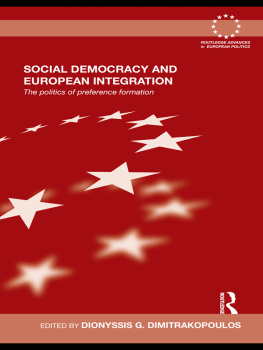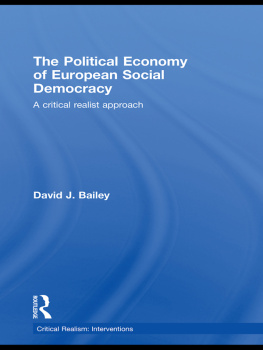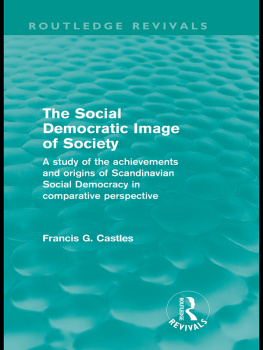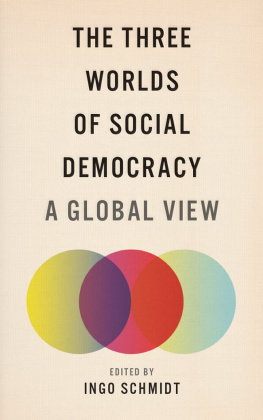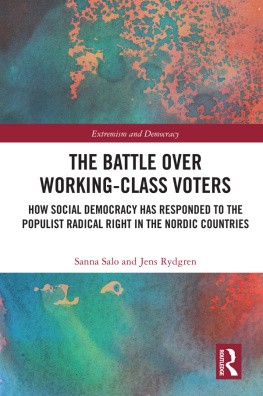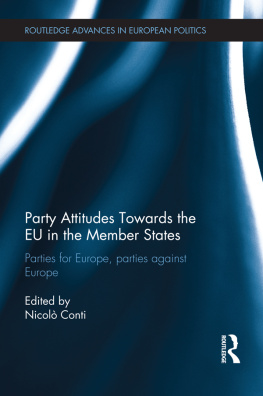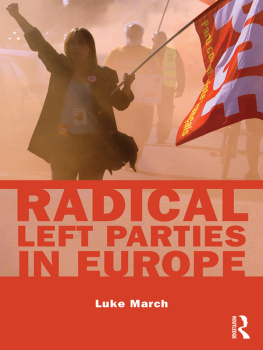Social Democracy and European Integration
What kind of Europe do social democratic parties prefer? What is the origin of their preferences? Are they shaped by interests, institutions or ideas? If so, how? Why do social democratic political parties respond differently to the crucial question of the future of the European Union? While many social democratic parties initially opposed European integration either in principle or because of the form it took, gradually they came to lend their full, though often critical, support to it. Despite this evolution, important differences between them have remained.
This book examines the preferences of social democratic parties in Germany, France, the UK, Sweden and Greece towards European integration, in comparative perspective. Using a variety of sources, including interviews with key party officials, the contributors explore what kind of Europe these parties want, and seek to explain the formation and evolution of these preferences over time. They examine the interplay of national peculiarities and cross-national factors and their impact on preferences on European integration. In addition to highlighting the role of party leaders, they reveal that, far from being united on European integration, these parties disagree with each other in part because they have retreated to varying degrees from key social democratic principles.
Making an important contribution to the scholarship on preference formation and the research that links the European Union with the nation state, this book will be of interest to students and scholars of the EU, comparative politics and political parties.
Dionyssis G. Dimitrakopoulos is Senior Lecturer in Politics at Birkbeck College, University of London, UK.
Routledge Advances in European Politics
1 Russian Messianism
Third Rome, revolution, Communism and after
Peter J.S. Duncan
2 European Integration and the Postmodern Condition
Governance, democracy, identity
Peter van Ham
3 Nationalism in Italian Politics
The stories of the Northern League, 19802000
Damian Tambini
4 International Intervention in the Balkans since 1995
Edited by Peter Siani-Davies
5 Widening the European Union
The politics of institutional change and reform
Edited by Bernard Steunenberg
6 Institutional Challenges in the European Union
Edited by Madeleine Hosli, Adrian van Deemen and Mika Widgrn
7 Europe Unbound
Enlarging and reshaping the boundaries of the European Union
Edited by Jan Zielonka
8 Ethnic Cleansing in the Balkans
Nationalism and the destruction of tradition
Cathie Carmichael
9 Democracy and Enlargement in Post-Communist Europe
The democratisation of the general public in fifteen Central and Eastern European countries, 199198
Christian W. Haerpfer
10 Private Sector Involvement in the Euro
The power of ideas
Stefan Collignon and Daniela Schwarzer
11 Europe
A Nietzschean perspective
Stefan Elbe
12 European Union and E-Voting
Addressing the European Parliaments internet voting challenge
Edited by Alexander H. Trechsel and Fernando Mendez
13 European Union Council Presidencies
A comparative perspective
Edited by Ole Elgstrm
14 European Governance and Supranational Institutions
Making states comply
Jonas Tallberg
15 European Union, NATO and Russia
Martin Smith and Graham Timmins
16 Business, The State and Economic Policy
The case of Italy
G. Grant Amyot
17 Europeanization and Transnational States
Comparing Nordic central governments
Bengt Jacobsson, Per Lgreid and Ove K. Pedersen
18 European Union Enlargement
A comparative history
Edited by Wolfram Kaiser and Jrgen Elvert
19 Gibraltar
British or Spanish?
Peter Gold
20 Gendering Spanish Democracy
Monica Threlfall, Christine Cousins and Celia Valiente
21 European Union Negotiations
Processes, networks and negotiations
Edited by Ole Elgstrm and Christer Jnsson
22 Evaluating Euro-Mediterranean Relations
Stephen C. Calleya
23 The Changing Face of European Identity
A seven-nation study of (supra)national attachments
Edited by Richard Robyn
24 Governing Europe
Discourse, governmentality and European integration
William Walters and Jens Henrik Haahr
25 Territory and Terror
Conflicting nationalisms in the Basque country
Jan Mansvelt Beck
26 Multilateralism, German Foreign Policy and Central Europe
Claus Hofhansel
27 Popular Protest in East Germany
Gareth Dale
28 Germanys Foreign Policy Towards Poland and the Czech Republic
Ostpolitik revisited
Karl Cordell and Stefan Wolff
29 Kosovo
The politics of identity and space
Denisa Kostovicova
30 The Politics of European Union Enlargement
Theoretical approaches
Edited by Frank Schimmelfennig and Ulrich Sedelmeier
31 Europeanizing Social Democracy?
The rise of the party of European socialists
Simon Lightfoot
32 Conflict and Change in EU Budgetary Politics
Johannes Lindner
33 Gibraltar, Identity and Empire
E.G. Archer
34 Governance Stories
Mark Bevir and R.A.W. Rhodes
35 Britain and the Balkans
1991 until the present
Carole Hodge
36 The Eastern Enlargement of the European Union
John OBrennan
37 Values and Principles in European Union Foreign Policy
Edited by Sonia Lucarelli and Ian Manners
38 European Union and the Making of a Wider Northern Europe
Pami Aalto
39 Democracy in the European Union
Towards the emergence of a public sphere
Edited by Liana Giorgi, Ingmar Von Homeyer and Wayne Parsons
40 European Union Peacebuilding and Policing

